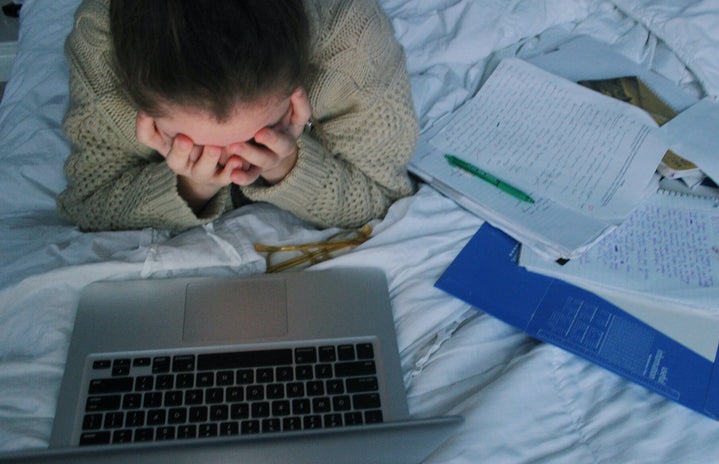Plagiarism is a term that is meant to strike fear in the mind of college students. Professors float around stories of students getting expelled for academic dishonesty as if they were ghost stories around a campfire. The rules of various citation styles are drilled into our heads to eliminate the chance of even accidentally plagiarizing someone. But what if you’re the one being plagiarized? And worse– what if the one plagiarizing your work is not a someone but a company profiting off of it?
One steamy afternoon this past summer, I was relaxing after my shift at my summer job and thought it would be fun to Google my name and see what would come up. It was all things I had seen before except a couple of new links to websites that I had never heard of. These websites looked sketchy to say the least, as if you could get a virus by just hovering your mouse a little too close to the link. The one that looked the least suspect was a website called Bartleby, so I proceeded to click on the search result only to be staring back at my Honors Global History final paper from my freshman year of high school.
Bartleby touts “access to thousands of student-penned essays that can act as thought starters for students struggling to draft their own paper” in order to help students “jump-start their writing assignments.” At best, this service is a recipe for disaster and at worst this is a euphemism for plagiarizing someone else’s work.
My paper was uploaded without my knowledge or consent with the full original header of my full name, high school, teacher’s names, and class. This could have easily acted as an invitation for anyone that stumbled across my paper to try find me and where I live. To this day I have no idea how they found this paper. However, my teacher did require us to upload our essays through TurnItIn, a plagiarism checker, ironically enough, similar to SafeAssign here at Stony Brook. This is my only guess as to how my essay made it onto the Internet at all. It should then be noted that in TurnItIn’s privacy and security policy, they do have a repository of all assignments uploaded to TurnItIn of which schools may opt out. They also say that, “Data collected through our service will be limited solely to the purpose of providing the service for which you (the Client) have engaged Turnitin.”
At the time I found my essay, I was not even allowed to read it without paying for a monthly subscription to Barteley. The preview allowed just enough for anyone to see my personal information but denied access to everything past the introduction of my paper. Oh and the kicker? Bartleby appears as a reputable website because it is owned by Barnes & Noble. Yes, a massive bookstore chain was trying to charge me money to read my own essay.
To make a long story short, I left a negative review (a review that was added to a growing list of people feeling that they were ripped off, I might add) and forgot about it. About two months later, I checked again to find that my paper had quietly been taken down. Some changes were also made to the website, like changes in wording, that I suspect might have been made to protect themselves from legal actions. While, I am not suggesting that I was the catalyst for these refinements I do think it was something interesting to note. In fact, Bartleby removing my essay may have been entirely unrelated to my post about them. I secretly hope for this to be false so that it may show the power of well organized complaint on the Internet against a large company and that, maybe, whoever works there has some morals about intellectual property.
In telling some of my friends this saga, many thought I should pursue legal action. While a class-action lawsuit might sound tempting, monetary compensation was never my primary concern. Having my essay on Bartleby, felt like a violation of my privacy which was compounded by the fact that I was never contacted about whether they could use my work or not.
With websites like Bartleby that are practically begging you to pay money for you to copy someone else’s essay, it’s the easiest it has ever been to plagiarize and to be plagiarized. You might be wondering, “But what about the other sketchy websites? The ones that’ll give you a virus just by looking at the URLs a little bit too hard?” Those websites were a little less subtle than Bartleby by offering to sell you a prewritten essay. They have access to thousands of essays that they go on to sell, one of which may be even yours.
My essay appeared to be taken down from those kinds of sites, once my paper was removed from Bartleby. There are many reasons as to why that might be, and should not be taken as an implication, that Bartleby has some kind of side hustle selling essays to desperate students.
So what did I learn from all of this?
In short, be an advocate for yourself. Protect your work and your right to privacy. While I can’t say for sure that my public complaints were the cause of the removal of my essay, that shouldn’t dissuade you from speaking up if you should ever find yourself in a similar situation. My story may be an extreme example but think about every group project that you have had to pick up someone else’s slack on: never reward laziness or the sense of entitlement over your work for the sake of not being bothered.
It also wouldn’t hurt to Google your own name and see what comes up. You never know, you just might get ripped off by a major company.



